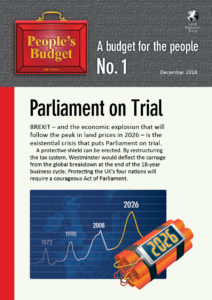The first of a new regular series of AGR commentaries from economist Fred Harrison of the Land Research Trust, designed by SLRG’s Ian Kirkwood, in which the interests of the peoples of the British Isles are at last placed centre stage.
When political power was devolved to Scotland, Wales and Northern Ireland,
the politicians in Westminster failed to re-base tax policies in ways that would equalise people’s life chances across the UK. The Brexit crisis provides the opportunity for regional authorities to renegotiate the fiscal settlement.
A new language that favours inclusive justice must replace the old concepts that were designed to divide and rule. The adversarial language was used by Scotland’s finance secretary Derek Mackay when he informed the Financial Times this week that he could impose higher tax rates on the “richest” people (but not yet). Words like rich and wealth are toxic tools that distort public policy. They disguise the streams of income that ought to be taxed.
Some people get rich by working hard: they add value to people’s well-being,
and they are rewarded accordingly.
Others get rich without adding to anyone’s well-being. This activity is pure rent-seeking, the legacy of an obsolete parliamentary politics.
Why treat these two groups as identical for revenue purposes?
Under the fiscal philosophy that prevails in Westminster, London and the South-east will always fare better than people in other regions. Now is the time for all representative institutions to engage in discussion on how to revise the flow of revenue into the public’s purses to achieve equitable outcomes across the four nations of the UK.
